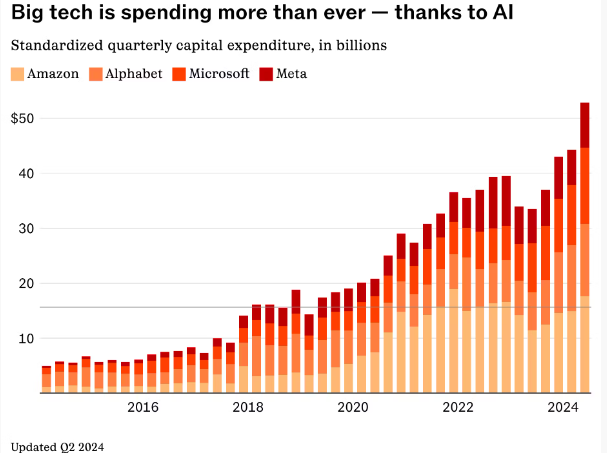Third quarter financial results from artificial intelligence investors Alphabet, Meta, Microsoft and Amazon predictably showed the perceived importance of AI capex on earnings. Such capex keeps growing, leading to concerns about monetization and pace of revenue growth.

source: Sherwood
But generative AI, the current focus of capex, might be--if not a full-blown general-purpose technology--the sort of digital product that creates a whole new--and big--industry. Think of the past pattern of new industries built on firms and products including operating systems, e-commerce, search, social media and online advertising in general, plus still-growing businesses such as ride-hailing and peer-to-peer lodging.
if generative AI winds up being a “winner take all” business, as most other computing segments have been, there will be no prize for third best, and limited advantage for being second best.
We have already seen that pattern in many other computing markets. The leader in search has 91 percent market share. The browser leader has 65 percent share. The mobile operating system leader has 72 percent share. The U.S. ride-hailing leader has 68 percent share.
Market | Dominant Player | Market Share | Runner-up | Market Share |
Search Engines | Google | 91.9% | Bing | 3.0% |
Desktop Browsers | Chrome | 65.72% | Safari | 18.22% |
Mobile Browsers | Chrome | 66.17% | Safari | 23.28% |
E-commerce | Amazon | 37.8% (US) | Walmart | 6.3% (US) |
Video Streaming | YouTube | 2.5B users | Netflix | 231M subscribers |
Music Streaming | Spotify | 31% | Apple Music | 15% |
Ride-hailing (US) | Uber | 68% | Lyft | 32% |
Cloud Services | AWS | 32% | Azure | 22% |
Mobile OS | Android | 71.8% | iOS | 27.6% |
So, whether investors like it or not, would-be leaders of the generative AI ecosystem are pouring resources into the effort to lead the new market. And that investment intensity affects investor perceptions, even as the big firms continue to post revenue growth.
Alphabet reported a robust 15-percent revenue growth; 35-percent cloud computing revenue growth; operating income up 34 percent but also AI-focused capital investment up 72 percent.
“And as we think into 2025, we do see an increase in AI-focused capital investment coming in 2025,” said Alphabet CFO Anat Ashkenazi.
So does Amazon, which expects capex to be about $75 billion in 2024 and “more than that in 2025,” according to Amazon CEO Andy Jassy. “And the majority of it is for AWS and specifically, the increased bumps here are really driven by Generative AI.
“Our AI business is a multi-billion dollar business that's growing triple-digit percentages year-over-year and is growing three times faster at its stage of evolution than AWS did itself,” said Jassy.
Generative AI “is a really unusually large, maybe once-in-a-lifetime type of opportunity,” he said.
All that is fueling investment into generative AI, which based on recent computing product precedent, will produce a “winner take all” market.
Company | 2024 Estimated AI Capex | 2025 Estimated AI Capex |
Microsoft | $80 billion | Significant increase |
Amazon | $75 billion | Further increase |
Alphabet | $52 billion | Increase expected |
Meta | $38-40 billion | Significant growth |
Microsoft and Meta Platforms both beat analyst expectations with their quarterly earnings reports, but also said more AI spending is coming, pushing down share prices for both firms.
Microsoft CEO Satya Nadella noted continued capacity constraints at data centers amid surging demand, but also continues heavy spending on cloud and AI to scale to alleviate capacity constraints.
Meta CEO Mark Zuckerberg also forecast a "significant acceleration" in spending on AI-related infrastructure in 2025. Zuckerberg acknowledged that this may not be what investors want to hear in the near term, but insisted that the opportunities here "are really big."
GenAI is a big gamble. Based on history, we might suggest that all but one or two of these efforts will fail, and the list of serious contenders also includes OpenAI and others. Should that pattern hold, the top two companies might have 60 percent to 80 percent share of the total market.
Market Position | Market Share | Profit Share |
Leader | 70-90% | 80-90% |
Runner-up | 10-20% | 5-15% |
Others (3-10) | 5-10% | 0-5% |
